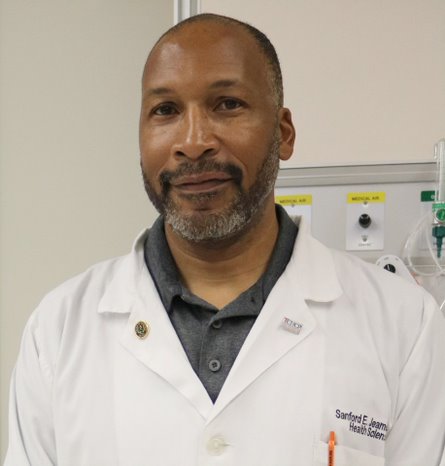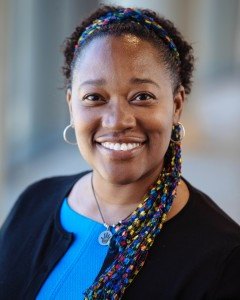
Practical Solutions to Better Engage Cancer Professionals with Communities of Color
-
Register
- Non-member - Free!
- Member - Free!
Practical Solutions to Better Engage Cancer Professionals with Communities of Color
Thursday, March 18, 2021
3:00 - 3:45 PM EDT
Although cancer incidence and mortality overall are declining in the U.S., certain communities continue to be at risk of developing or dying from particular cancers. To better address the needs of these populations, it will be critical to engage marginalized communities in their care, provide bias training to healthcare professionals, and form impactful, collaborative relationships with patients, caregivers, and local agencies.
On Thursday, March 18, an expert panel will review currently available data on cancer care disparities, discuss the needs of disadvantaged populations, and share practical solutions and methods for implementing bias training and bidirectionally engaging your cancer program or practice with local community representatives.
Speakers:
- Sanford E. Jeames, DHA, Coordinator of Health Sciences; AISD Faculty Instructor, Adult Degree Program, Huston-Tillotson University
- Lailea Noel, PhD, Assistant Professor, Department of Oncology; Assistant Professor, Department of Social Work, Dell Medical School at the University of Texas at Austin
- Nadine J. Barrett, PhD, MA, MS, Director, Office of Health Equity and Disparities, Duke Cancer Institute; Director, Duke Community Connections Core, Duke CTSA (Moderator)
All registrants will receive access to the on-demand recording and slides.
As part of the 2020-2021 ACCC President’s Theme, Community Oncology Can Close the Gap in Cancer Research, a President’s Task Force of clinical trials, health equity, and population health experts has been appointed to help inform, guide, and plan our approach to improving cancer care for all people.
Included in this important work is the creation of a monthly research newsletter and a series of live webcasts on research-related topics of interest.
If you experience any difficulties in creating an account to register for this webcast, please send us an email.
This webinar is open to the public. You do not need to be an ACCC member to view this webinar, but you will need to create an account in order to register.
If You DO NOT Have an ACCC Account:
- To start, click the green “Register” button in the upper right corner of this page. You will be directed to “Your Cart.” Click the green “Log In” button near the top of the page.
- ACCC and State Society Members: Click “Reset Password” to update your login information. When your password is updated, you will be redirected to the “My Profile” page.
- Non-members: Click “Create Account.” Once your password is created, you will be redirected to the "My Profile" page.
- Click “eLearning” at the top of your profile page to go back to the ACCC eLearning portal. In the box on the left side of the screen, click on the “Cart” link.
- The green box in the upper right corner of this page will indicate “You are registered!” for this course!
If You Have an ACCC Account:
- Please click the orange “Log In” button on the left side of this screen. You will be taken to the main login page that displays your email and password. Click the “Log in” button.
- You will be automatically redirected back to webinar page, and the green box in the upper right corner will say that “You are registered!” for this course!
PRO TIP: If you save your ACCC password to your computer and remain logged in, you can register for additional webinars and courses in a matter of seconds—with just one click!
For the best registration and viewing experience, please use Chrome, Edge, or Safari web browsers. Internet Explorer Users may experience difficulties accessing the webinar.
Once you complete your registration, you will receive an email from ACCC eLearning, which contains information on how to access this webinar. For assistance with registration or if you do not receive an email, please contact registration@accc-cancer.org.

Sanford E. Jeames, DHA
Coordinator of Health Sciences; AISD Faculty Instructor, Adult Degree Program, Huston-Tillotson University
Dr. Sanford Jeames is currently serving as the Coordinator of Health Science Programs at Eastside Memorial Early College High School in Austin, Texas; and is an Adjunct Professor at Huston-Tillotson University in Austin, Texas.
He is Chair-Elect for the ASCO Health Equity Committee, and has memberships in the Society of Urological Surgical Associates (SUNA), American Association of Cancer Research (AACR) and the American Society of Clinical Oncologists (ASCO). He is currently serving as a panel member of Canadian Institutes for Health Research (CIHR) and has served on the Clinical Trials Advisory Panel for Patient Centered Outcomes Research Institute (PCORI). He is Merit Protocol Reviewer for PCORI, member of the Patient Advocate Steering Committee (PASC) and Cancer Care Delivery Research Steering Committee (CCDRSC). Jeames is a manuscript reviewer for the Urologic Nursing Journal and the Journal for the Poor and Underserved.

Lailea Noel, PhD
Assistant Professor, Department of Oncology; Assistant Professor, Department of Social Work, Dell Medical School at the University of Texas at Austin
Lailea Noel is an assistant professor at the Steve Hicks School of Social Work.
Noel’s research investigates the social and economic conditions that contribute to lower cancer treatment utilization and higher mortality rates in marginalized communities, particularly communities of color, and communities within residentially segregated urban and rural neighborhoods. She has a passion for conducting community-based participatory research and has a wealth of experience engaging communities, social scientists and medical professionals in such research partnerships. Her research interest and approach are informed by the two decades she spent as an oncology social work administrator at prestigious organizations — including the American Cancer Society and University of Michigan Comprehensive Cancer Center — prior to pursuing her Ph.D.
During her doctoral studies at Washington University in St. Louis, Noel participated in a five-year, community-based participatory research project in an area with high rates of poverty and the worst cancer mortality rates in metropolitan St. Louis. Her dissertation work, supported by an American Cancer Society Doctoral Training Grant in Oncology Social Work, explored the experiences of African American women in St. Louis, who had not started treatment for breast cancer six-months to two years following diagnosis. Since she joined the NYU Silver faculty in 2016, and was the 2018-19 Donald D. Harrington Faculty Fellow at The University of Texas at Austin.

Nadine Barrett, PhD, MA, MS
Director, Office of Health Equity and Disparities, Duke Cancer Institute Director, Duke Community Connections Core, Duke CTSA
Dr. Nadine J. Barrett is a medical sociologist and an assistant professor in the Department of Community and Family Medicine, within Duke University’s School of Medicine. She is the inaugural director of the Office of Health Equity and Disparities at the Duke Cancer Institute and serves as the director of the Duke Community Engagement Core, within the Center for Community and Population Health Improvement. A health equity and stakeholder engagement strategist, Dr. Barrett applies her expertise across three interrelated areas: 1) linking vulnerable communities to health services and research, 2) leveraging community and health system assets and services to align priorities and improve community and population health, and 3) convening diverse stakeholders to develop community and patient-centered programs, services, and research.
In 2017, she accepted an ACCC Innovator Award on behalf of Duke Cancer Institute for its initiative, Come Together: A Health Disparities & Equity Cancer Program Built on Community Collaboration. She is the recipient of several awards, including the American Sociology Association’s Minority Fellowship Award, an NIH Postdoctoral Fellowship in Health Services Research, and the MLK Southern Christian Leadership Conference Drum Major for Justice Award. Her national appointments include the PCORI Health Disparities Advisory Panel Board and the ACCC Board of Trustees. Dr. Barrett is both passionate about and committed to achieving health equity.
Dr. Barrett has several funded projects including Project PLACE (Population Level Approaches to Cancer Elimination), funded by the National Cancer Institute (NCI), which is a three-pronged research project designed to implement three robust mechanisms to inform the health equity strategic direction of the Duke Cancer Institute over the next five to eight years. Project PLACE is a highly intensive community engagement model and platform designed to shape robust scholarly productivity, partnered research and community programs to improve population health. She is also the Duke PI (subcontract) of a national Susan G. Komen pipeline training grant on translational research in inflammatory breast cancer and community-engaged research. Dr. Barrett also co-directs the NCI-funded Cancer Research and Education Program Core of the NCCU/DCI Translational Health Disparities Research Program which incorporates specified training in minority accrual in clinical research—a program she developed within the Duke Cancer Institute titled, “Just Ask.”
